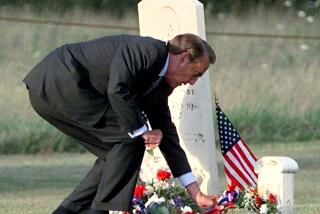WWII veterans Dole, McGovern eye to eye on war
- Share via
WASHINGTON — It is a tale of two veterans, two senators, two parties, two presidential candidates, one war.
Bob Dole, the wisecracking conservative, and George McGovern, the professorial peacenik, shared the stage Thursday as Washington, D.C., kicked off its summer-long tribute to the World War II generation. Prompted by Marc Pachter, director of the National Portrait Gallery, they talked about how the war changed them and the country.
Dole talked about how the armed services were integrated after the war, how women’s roles in the workplace were forever transformed, how a generation of kids without wealth or influence was afforded a college education.
“The biggest piece of legislation that the country ever passed was the GI Bill,” Dole said. Agreed McGovern, “It changed my life.”
In their time, Dole -- who served 27 years as a U.S. senator before running for president in 1996 -- and McGovern -- who served 18 years in the Senate and ran for president in 1972 -- disagreed on many issues, most notably the Vietnam War. McGovern ran for president as the candidate of the antiwar movement. Dole ran for president as the titan of the Republican Party, the veteran war horse who had earned a shot at the winner’s circle.
But on this day, on the eve of the dedication of the National World War II Memorial, they agreed on the need to use caution before going to war -- “We can’t be the world’s policeman,” Dole said -- and on the corollary need to be prepared -- “I would never want to see the country move to that [pre-World War II] level of unpreparedness again,” McGovern said.
They were both young men when World War II started, with little knowledge of the world outside their communities. Dole said he was attending a lot of parties at the University of Kansas in 1943 when a teacher suggested that since he wasn’t doing much at school, he might as well enlist in the Army. “Did you know what was going to happen to you?” Pachter asked. “I knew I was going to get a haircut,” Dole replied.
McGovern, who wanted to be a pilot, said he enlisted in the Army for two reasons. One was to prove to his critical high school coach that he was not lacking in courage. The other was a rumor that the Army Air Corps, unlike the Navy Air Corps, would give you a free meal ticket near the base in Omaha.
Their tales of war service have been much chronicled.
Historian Stephen Ambrose, in “The Wild Blue: The Men and Boys who Flew the B-24s Over Germany,” centers his story on McGovern. In unheated planes, where temperatures could tip 50 degrees below zero, pilots often navigated by sticking their heads out the windows.
McGovern told the story of how once, over Austria, his plane was hit and he lost two engines. He managed to complete the run but the crew informed him that a bomb was stuck. He told them to dump it somehow. They finally unleashed it over a farmhouse at noon.
For years McGovern feared that he had killed a family at lunch. Years later, an Austrian farmer informed him that he had seen the plane coming, had evacuated his family and that he loathed Hitler. “If bombing my farm made the war end one day earlier, it’s OK with me,” McGovern quoted him as saying.
In the book “What It Takes,” journalist Richard Ben Cramer chronicled the major presidential candidates in 1988. No portrayal was as gripping, or as revelatory, as that of Dole’s war injury and his recovery.
Dole was savaged by a piece of shrapnel that penetrated his right shoulder, exploded internally, broke his collarbone, smashed into his vertebrae and crushed a piece of his spine, leaving him paralyzed on his right side. Two medics were killed trying to get to him. Doctors at a hospital in Italy did not think he would live and were certain he would never walk. His temperature once hit 109 degrees.
Back home, he was hospitalized for 39 months, enduring multiple operations, willing his body to cooperate with grueling repetitions on ropes in the family garage.
To this day, he masks the disability in his right side and the deadness of his right hand by clenching a pen, shaking hands with his left.
Dole was instrumental in getting the World War II Memorial approved -- and in raising funds to build the monument. “I didn’t pick the design,” he said. “All I did was pick a lot of pockets.”
The former Senate majority leader contrasted the sacrifice that falls almost exclusively on military families today with the unified sacrifice of the nation during World War II -- no nylons, rationed food, darkened windows. “That’s why we were so together,” he said.
Without mentioning Iraq, he questioned the need for wars of preemption, saying “that should not be policy,” adding that sometimes there are exceptions.
McGovern said his parents were lifelong Republicans. He imagined them looking down, approvingly, as he sat next to Dole. Dole, for his part, was equally cordial to McGovern, calling him a friend. “We’re not the oddest couple,” he said.
More to Read
Get the L.A. Times Politics newsletter
Deeply reported insights into legislation, politics and policy from Sacramento, Washington and beyond. In your inbox twice per week.
You may occasionally receive promotional content from the Los Angeles Times.










